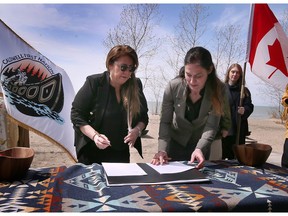
Article content
A landmark agreement will see Caldwell First Nation help manage the much-anticipated Ojibway National Urban Park in Windsor.
Caldwell leaders on Monday signed a memorandum of understanding with Parks Canada marking their shared commitment to overseeing conservation efforts and the operation of Ojibway National Urban Park, a protected natural area in the city’s west end.
Advertisement 2
Article content
Article content
“This MOU with Caldwell First Nation is an incredibly significant milestone in the Ojibway National Urban Park process,” said MP Irek Kusmierczyk (L — Windsor-Tecumseh).
“First Nations were the original stewards of this land, and it’s about reconnecting to that heritage.”
The planned national urban park includes the 865-acre blueprint of the Ojibway Prairie Complex, as well as surrounding natural areas.
A ceremony at Point Pelee National Park, the traditional land of Caldwell First Nation, was held Monday to mark the moment of reconciliation in action. About 50 community members and politicians gathered at the Northwest Beach Pavilion for the ceremony.

“Signing this agreement at Point Pelee National Park, the heart of our ancestral lands and waters, highlights the positive relationships we have already built with Parks Canada,” said Chief Mary Duckworth of Caldwell First Nation.
The agreement establishes Indigenous communities as “co-creators and co-managers” of the national urban park following more than a year and a half of discussions, said Kusmierczyk.
Advertisement 3
Article content
“They have knowledge and experience that they will be sharing with us, in terms of leading conservation efforts and protecting the Ojibway lands and the surrounding water,” he added.
“So this process is about connecting our community to the land and the waters of Ojibway, but it’s also about us connecting to the history, knowledge, and tradition of First Nations; specifically Caldwell First Nation, Walpole Island First Nation and the Chippewas of the Thames First Nation.”
The Ontario government announced in April last year that it would hand over the Ojibway Prairie Provincial Nature Reserve for the national urban park.
Another vital piece of land — Ojibway Shores — was also transferred from Transport Canada and Port Windsor to Parks Canada. The 33-acre natural area boasts roughly seven acres of shoreline waterfront.
“As the original stewards of lands and waters in Canada, it is imperative that Indigenous peoples tell their stories,” said Ron Hallman, president and chief executive officer of Parks Canada.
“By enhancing relationships with First Nations, like we are doing with Caldwell First Nation, we are ensuring that the factual histories of these places are being shared with current and future generations.”
Advertisement 4
Article content
The agreement is over two centuries in the making, according to Duckworth.
Indigenous communities relinquished a large swath of land in southwestern Ontario to the British in 1790. The McKee Treaty was signed by the chiefs of the Chippewa, Ottawa, Potawatomi and Huron people — but the Caldwell people never signed it.
Caldwell fought alongside the British in the War of 1812 believing that their traditional lands — which stretch from the Detroit River all the way to Long Point on the north shore of Lake Erie, including Point Pelee National Park — would be returned to them in exchange. The promise was unfulfilled, and in the late 1850s, the Caldwell people were forcefully driven from their land by the RCMP.
“As First Nations in Southwestern Ontario, we were never given the opportunity to contribute our ways of knowing, being, and doing,” said Chief Duckworth.
“We will honour and protect all our relations now.
“We look forward to collaborating with Parks Canada on creating a First Nations approach to shared governance of the proposed Ojibway National Urban Park.”

Steps to create a national urban park in Windsor began in August of 2021. The city was selected as one of six communities by the federal government for its new National Urban Park Program.
Advertisement 5
Article content
Since then, the Canadian government has provided roughly $3 million to Windsor to advance through the planning stages.
In July last year, Parks Canada granted $1.2 million to match funding from the University of Windsor to launch a National Urban Park Hub — Canada’s first teaching, research and community engagement project to help develop a template for other municipalities to follow.
“It’s one of the good stories of reconciliation in Canada that we have,” said Windsor West’s member of parliament Brian Masse (NDP), who led the years-long effort for federal legislation to establish a national urban park in the city.
Recommended from Editorial
Last April, a near-unanimous vote in Parliament, with support from all parties, laid the groundwork for the establishment of Ojibway National Urban Park.
“Now it’s come full circle, and Caldwell First Nation will be part of, not just special moments and projects, but also daily life,” said Masse.
Advertisement 6
Article content
“They’ve been part of it from the beginning, and they’ll be with it to see it through to the end.”
Kusmierczyk added that Windsor is the only municipality chosen for the federal government’s program that has advanced beyond the pre-feasibility phase, and is on track for a national urban park within the next year and a half.
“We are the most advanced in terms of being ready to establish an Ojibway National Urban Park,” he said.
“We are on an accelerated time frame in terms of creating a national urban park, and I am confident that we’ll have it open within the next year and a half. I feel very confident about that.”
National urban parks in Halifax, Winnipeg, Saskatoon, Edmonton, and Victoria have not yet entered the planning stages.
Article content







